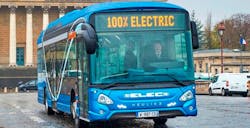Forsee Power Supplying 42-kWh Batteries for French Electric Buses
IVECO France, which operates in the passenger transport segment through its IVECO Bus and Heuliez brands, has renewed its partnership with battery systems firm Forsee Power.
Under the partnership, Forsee Power will supply its high-energy ZEN 42 batteries to IVECO France for its Heuliez GX 337 ELEC electric bus models.
The ZEN 42 is a 42-kWh modular system designed for integration on the roof and at the rear of the bus. The energy density is 147 Wh/kg, which enables vehicles to be driven throughout the day without the need for a recharge. It can provide a range of 300 kilometers with 460 kWh on board the bus, which means, it can carry up to 5 more passengers than the ZEN 35.
Forsee Power has been supplying batteries for the GX ELECs since 2013.
IVECO France’s electric range is marketed under the GX ELEC Heuliez brand in France and IVECO E-WAY internationally. The firm holds a market share of 44% in the electric bus segment in France.
About the Author
EnergyTech Staff
Rod Walton is head of content for EnergyTech.com. He has spent 17 years covering the energy industry as a newspaper and trade journalist.
Walton formerly was energy writer and business editor at the Tulsa World. Later, he spent six years covering the electricity power sector for Pennwell and Clarion Events. He joined Endeavor and EnergyTech in November 2021.
He can be reached at [email protected].
EnergyTech is focused on the mission critical and large-scale energy users and their sustainability and resiliency goals. These include the commercial and industrial sectors, as well as the military, universities, data centers and microgrids.
Many large-scale energy users such as Fortune 500 companies, and mission-critical users such as military bases, universities, healthcare facilities, public safety and data centers, shifting their energy priorities to reach net-zero carbon goals within the coming decades. These include plans for renewable energy power purchase agreements, but also on-site resiliency projects such as microgrids, combined heat and power, rooftop solar, energy storage, digitalization and building efficiency upgrades.
